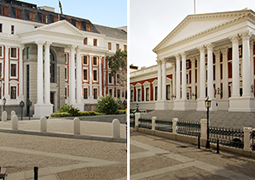
For a soundbite of Parliament’ Spokesperson, Mr Moloto Mothapo, click on the link: https://iono.fm/e/1195690
Parliament, Tuesday, 21 June 2022 - Parliament wishes to clarify and put into correct context latest determination of annual increase on the remuneration of public office bearers, including Members of Parliament in the National Assembly and the National Council of Provinces.
Certain media reports have implied that the three percent (3%) salary increase for public office bearers approved by the President, earlier this month, on the recommendation of the Independent Commission for the Remuneration of Public Office Bearers, was “tone deaf.” Nothing could be further from the truth.
Public office bearers like Ministers, MPs, MPLs last had salary increases in April 2019 when the Commission recommended a 2.8 % increase.
Because of the prevailing and difficult economic conditions, it was important that the remuneration of the public office bearers be adjusted to enable them to cope with the rising costs of living. The average consumer inflation rate has been on the increase, and for 2021, it was 4,5%, which is higher than the averages recorded for 2020 (3,3%) and 2019 (4,1%) - resulting in the buying power of the disposable income becoming lower.
Another important factor that must be highlighted - a matter that is sometimes misinterpreted - is the fact that salaries of MPs are published as a total remuneration package (total cost to company) and not cost-plus benefits.
For example, if an ordinary MP earns say R1,1 million per annum, that includes the basic salary, a flexible portion, a travel allowance, a political office bearers’ allowance, and a contribution to the pension fund. Other deductions that will be taken from the salary includes tax (Pay as You Earn), medical aid, party contributions, village accommodation and others authorised by the individual MP like a bond or car instalment.
While it is understandable that remuneration of public representatives would often spark a public debate given the transparency with which they are processed, constant scrutiny over their work as well as the socioeconomic challenges faced by the country, it must be appreciated that they do not determine their own remuneration. An independent commission is charged with such responsibility; it recommends any decision for the approval of the President before being gazetted. Unlike in other countries (58% of world parliaments according to the Inter-Parliamentary Union survey), Members of Parliament do not play any role in the process of determining either their salaries or annual increments.
It also equally vital that public representatives are fairly remunerated consistent with their scale of responsibilities under the Constitution. For instance, there is a total of 341 parliamentarians (minus Ministers, Deputy Ministers and Deputy President) in the National Assembly who are responsible for oversight over state institutions constituted of hundreds of thousands of employees, including high-ranking executives. Compared with salaries of public service employees, parliamentarians earn at scale equal to junior-level management.
Further, with a 2022/2023 total parliamentary budget of R1,9 billion, R62 million of which allocated for oversight committees, parliamentarians are expected to conduct oversight over a national budget totalling R1,6 trillion.
In analysing and scrutinising the remuneration of public representatives, we must also benchmark it against those of their counterparts globally, particularly in similar developing countries. A desktop survey suggests that South African public representatives do not earn anywhere higher than those of countries with similar GDP and population, amongst other considerations.
It is also worth noting that, as an additional safeguard, unlike in several other countries, South African MPs are barred from undertaking any other remunerative responsibilities outside of their parliamentary work. Should they take up such work, they are obligated to declare it for scrutiny in terms of the Ethics Code.
In subscribing to checks and balances system that excludes them from having a say in the determination of their remuneration, parliamentarians demonstrated appreciation that public service is not about self-enrichment or luxury. In this regard, public representatives would be the last to insist on anything beyond an independently determined just, fair and sustainable remuneration commensurate with their obligations under the Constitution and the law.
ISSUED BY THE PARLIAMENT OF THE REPUBLIC OF SOUTH AFRICA
Media Enquiries: Moloto Mothapo

